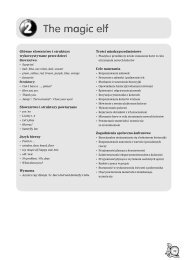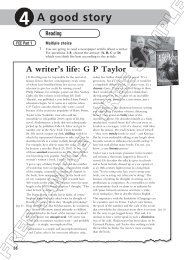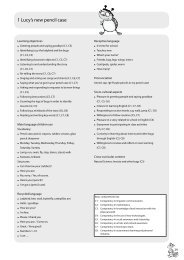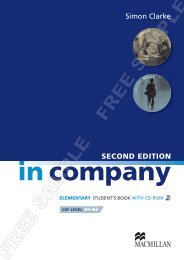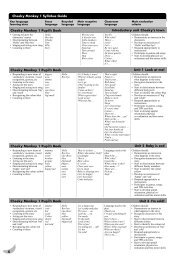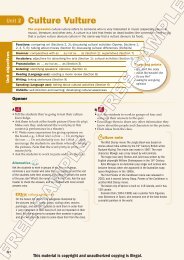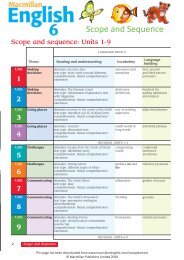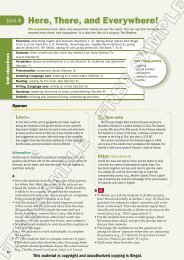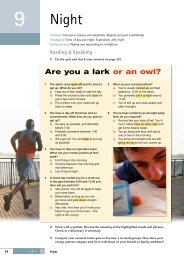fr eesamp le fr eesamp le - Macmillan
fr eesamp le fr eesamp le - Macmillan
fr eesamp le fr eesamp le - Macmillan
Create successful ePaper yourself
Turn your PDF publications into a flip-book with our unique Google optimized e-Paper software.
5 Now write your views about emails, using the comments in 4 as a model.______________________________________________________________________________________In my opinion,____________________________________________________________________________________________________________________________________________________________________________Further practice6 6 Pronunciation practice. Listen to the email addresses and repeat them.jtidman@deltainternational.co.ukTombuddell-25@yahoo.comuwe_timm@deltainternational.de7 Now ask three other peop<strong>le</strong> you know for their email address and write them down.Key wordscorrespondence (noun): the process of writing and receiving <strong>le</strong>tters or emailslook forward to (phrase): to feel happy about something that is going to happennegotiate (verb): to try to reach an agreement by discussing something in a formal wayrequest (noun): the act of asking in a polite or formal way8 Present continuous. Make full sentences in the present continuous. The first one is an examp<strong>le</strong>.1 I / look forward / meet you next week I am looking forward to meeting you next week.2 Our biggest client / visit / today3 the printer / work?4 He / not sit / his offi ce5 you / come / the meeting?Over to you9 Prepare answers to these questions.1 How often do you write emails to participants after you have arranged a meeting?2 Who do you write to? (Customers, clients, suppliers, English-speaking col<strong>le</strong>agues?)3 What type of emails do you write in English? (Long, short, formal, informal?)10 Now interview other col<strong>le</strong>agues about the emails they write. Make a note of their answers and reportback your findings.11 Read email B <strong>fr</strong>om exercise 1 again. Imagine you are Tom Buddell <strong>fr</strong>om Softecco. Instead of sendingan email, you have to te<strong>le</strong>phone Jenny Tidman and <strong>le</strong>ave a message on her answer phone about thetraining day. Write out your message, then practise saying it.12 Now turn to Case study 3 on page 87 for further practice on writing emails.13 For a list of expressions <strong>fr</strong>om this unit, see Useful language Unit 3 on page 94.Unit 3 Writing emails in preparation for meetings 17FREE SAMPLE FREE SAMPLE




